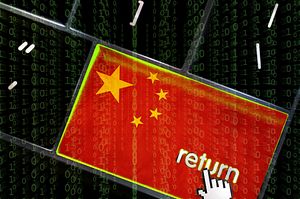In an embarrassing high level security breach of personal information, the names, addresses and national identification numbers of members of the Chinese elite were leaked on Twitter on Thursday, May 12. The Twitter handle @shenfenzheng, which coincidentally means “ identification card” in Mandarin, published the personal information of Chinese government and business titans Wang Jianlin and Jack Ma, and the creator of the The Great Firewall of China, Fang Binxing. The posts were openly exposed to over 300 million of Twitter’s active users.
The leaked birth dates, family members, and addresses were available for at least an hour, with an ominous message “Surprised by these tidbits of information? I hope this can get fellow countrymen thinking. Personal privacy is worth nothing in China.” @shenfenzheng was quickly suspended by Twitter. Information about the leak wasn’t covered in the Chinese media and a spokesman from China’s Public Security Ministry declined to comment. Despite Beijing’s silence, the government has likely already begun an investigation into the identity of the leaker and the process of upgrading protocols to safeguard the personal information of China’s government and business leaders.
While it’s not outside the realm of possibilities that the leak could have originated outside of China from an online hackitivist group, domestic dissidents, or a foreign government, this latest leak will likely only strengthen China’s resolve to protect its cyberspace. Coming on the heels of the Panama Papers leak, which exposed the personal financial information of Chinese President Xi Jinping’s brother-in-law, Deng Jiagui, China’s elite have increasingly seen their private lives and image come under attack.
Beijing is determined to lead the way in defining and legitimizing cyber sovereignty—the rights of each country to enforce its own ideas and laws over its cyberspace. This has been particularly appealing for countries who believe that Western ideals and companies reign sovereign over today’s Internet. The Chinese government has increasingly criticized what it considers to be U.S. dominance over the internet. Meanwhile, China and Russia have increased cooperation in various initiatives to “regain” control over their cyberspace.
The idea of Internet sovereignty has been enforced by various governments, most notably in the Middle East, for many years by censoring content that was considered religiously immoral or socially unacceptable. But it has only been recently that a major power has endorsed the idea of cyber sovereignty so authoritatively at the highest level of government. In 2014, Lu Wei, the director of the Cyberspace Administration of China, wrote an op-ed entitled “Cyber Sovereignty Must Rule Global Internet.” where he outlined a proposal for mutual respect and cooperation in cyberspace between the United States and China.
A year later at the opening of the 2nd World Internet Conference in Wuzhen, China, Xi delivered the conference’s keynote address at the opening ceremony where he stated unequivocally that every country had the right to govern its cyberspace in a matter that it sees fit. And just last month Lu Wei and Fang Binxing met their Russian counterparts in Moscow to share their expertise in filtering sites and content that the government deems unfit for public dissemination.
The Russian government has traditionally allowed its citizens a large degree of freedom on the Internet, but President Vladimir Putin has recently increased a crackdown against Western influence in Russia. In stark contrast to Russia’s traditional position of tolerating Internet freedom, the Chinese government has been a pioneer in content censorship for more than a decade. In a commentary on China and Russia’s cyber cooperation, Scott Feldman, a former senior advisor to the United Nations, argues, “The primary effort is keeping Chinese and Russian citizens away from foreign funding, foreign ideas, and foreign journalism.”
Feldman’s argument has merit as both governments have passed laws curtailing the the freedoms of NGOs and monitoring the activities of certain news outlets, which is within their rights as sovereign powers. However, China’s leaders see the mainland as a special case. With the rapid industrialization that China has experienced over the past 35 years, the Chinese government is concerned about a world that advances at a rate that they deem too fast for Chinese traditional culture and society to adapt to.
Beijing’s regulation of its domestic Internet content and infrastructure has often left Westerners—and even its own citizens— confused and bewildered regarding the procedures and content that might be deemed unsuitable for Internet users. In a recent example of content censorship, China banned online users from eating bananas in a provocative manner during live stream web casts. Though Beijing’s latest ban may seem funny or excessive to some—some users joked that the government may one day ban eating any fruit online—in actuality, the ban perfectly encapsulates Beijing’s view of cyber sovereignty. As much as people would like to believe in a global Internet community, Beijing believes cyberspace must still respect the culture, customs, and governance of the physical space defined by a country’s borders.
The concept of cyber sovereignty is relatively new to international diplomacy and it will likely take some time for governments and diplomats to recognize and agree on a governing framework. Domestically, the Chinese government is showing no signs of slowing down its Internet censorship regime as it has elevated the importance of its cyber sovereignty to the same status as its physical territorial sovereignty. What is clear today is that the Chinese government has learned from the dangers that Internet freedom can have in toppling ruling governments, as seen with the Arab Spring revolutions in the Middle East. Beijing is determined not to let history repeat itself on the mainland.

































